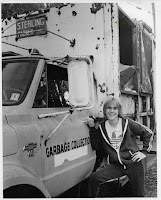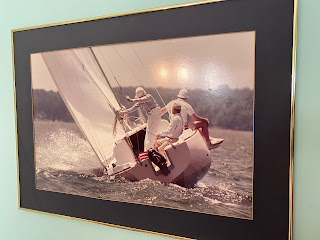The boss can make all the difference. A great boss can make a bad job better. A bad boss can make a great job suck. I have had several bosses in my life, and I have been a boss to many people. But I have never really been my own boss, until now. Sure, my wife and I briefly owned a toy store together. That was a partnership and we made all the decisions only after having thoughtful discussions with each other. And I have worked as an independent contractor as a Realtor, but that is not quite the same as being your own boss because you can only contract with one firm, which effectively makes the firm your boss. It is only now that I have started my own real estate firm that I can make truly executive decisions. And it scares the hell out of me.
Having never been the boss of myself, I don’t know if I am a good boss or bad boss. Will I make a potentially great job better? Or worse? I know who my good and bad bosses have been. And I know that many people that have reported to me thought that I was a good boss. But I am aware that some did not think I was a good at all. What can I learn from my former bosses that will help me always fall in the good boss column?
My first lesson learned in the good boss/bad boss scenario may have been at my very first job. I worked at a family owned campground and marina on Lake Norman. I started at age twelve and left at age seventeen. I began with one boss and left with another. My first boss was Buck Teague. Buck was big in stature and good in nature. A man with a hearty laugh, a quick and short-lived temper, and two police trained German Shepherds in the back of his pick-up truck. He built the docks himself. He built the tiki themed restaurant and tiki themed bathhouses. He built the floating restaurant known as “The Outrigger” from an old barge and a giant pontoon which supported the large covered deck that spanned the length of the barge. I think the fact that he built the whole enterprise himself was at the heart of what made Buck Teague a good person to work for. He was proud of what he had built, and he took the time to teach me how make any task into something you could take pride in. He wanted the toilets in the bathhouses to be clean enough that he could eat soup from them. He personally demonstrated for me how to use Red Devil Lye to scour the showers at seasons end, until they shined like new. Most importantly, he trusted me to operate the work vehicles used on the property. The garbage Truck, the tidy wagon (mail truck), and an old Ford Tractor. My second summer there, he allowed me to be the youngest gas dock attendant they had ever hired. It was a coveted position, but also one that came with great responsibility. Handling gas hoses around boat motors and water. And the even more risky business of handling cash around water. Buck trusted me, and he also held me accountable. He was firm and fair. He was a good boss.
Buck Teague died suddenly and unexpectedly when I was fifteen. His son, Earl, became my new boss. Earl worked in the office just to the side of “The Tiki Torch” gift shop. He had helped his Dad build the docks and buildings. But I don’t think Earl ever really felt like the business was his. He inherited it and that is all together different from taking something from your imagination and making it into something real. Earl grew up in the marina that his dad built. His work attire of shorts and docksiders were worn with an air of casual arrogance. Where his father was gregarious, Earl was aloof, hiding behind his mirrored shades. He had a slow boiling temper that was not short-lived. He could be casually cool to me one day and mean as hell the next.
Most of the time, I felt like Earl was just annoyed that he had to deal with me at all. He was constantly trying to catch me making mistakes with the gas-dock cash box. He was certain that I was not counting change correctly because the meter readings and my daily cash audit were not ever an exact match. The numbers would be off by a dollar or two in either direction. He was certain it was me and not the meters on the ancient and weathered gas pumps. He told me that I would have to start paying him for all the money I was losing. I was certain that I knew how to make change. So, I decided to add up all the overage and underage that was detailed in the thick spiral notebook I dutifully kept records in, as taught to me by Earl’s father. I brought him the final tally which indicated that, by his logic, he owed me fifteen dollars and some change. Earl turned red in the face and I swear I saw steam coming out of his ears. He put his wife in charge of me after that. And I grew more and more unhappy in what had been a real dream job for a kid like me. I quit when I found out that they had hired a friend of mine and started him at a higher wage than I earned. I had spent nearly five years of my life scrubbing toilets, cleaning out garbage cans full of maggots, and spending long days every weekend pumping gas for their customers. Earl was a bad boss.
What can I learn from Buck and Earl Teague that will help me be a good boss to myself and any future staff and brokers I will manage? Hopefully, I will benefit from building a business myself like Buck did. I am creating the brand and what I believe is a unique concept in the field of residential real estate.
I should take pride in not just my fiscal ownership of the business, but my creative ownership as well. I should trust myself and others to do a good job but hold myself and others accountable. Trusting yourself is harder than it sounds. I have a newfound respect for entrepreneurs. I should be firm, but fair. A simple concept that seems to be so difficult for too many bosses
Earl was never really emotionally invested in the business that may have been more of a burden than a blessing to him. I’m sure he would have done it all entirely different if he had the opportunity. I will try and remember to appreciate the opportunity of designing a business and not merely managing someone else’s creation.
Earl had no appreciation for the time and effort I devoted to his family’s business. He never noticed that I was excellent with customers. He never saw how they smiled happily at me as I helped gently guide their boats safely into the slips on the dock. He never noticed that I had learned to tie off a boat to a cleat in a clean and efficient single motion. He never remarked that the toilets were clean enough for him to eat soup out of.
I will do my best to give myself credit for a job well done and not just beat myself up for the mistakes I am bound to make. I will strive to always notice the best qualities that the people who work for me bring to the job and I will make sure that they know that I notice.
I am looking back now on all of my experiences of having a boss. I am reflecting on my past actions or inactions as a boss and how they factored into whether I was perceived to be a good boss or a bad one. I want to be a great boss. And I think I may have just taken on the most challenging employee I have ever had to manage. Myself.




















